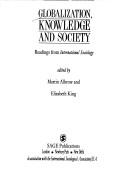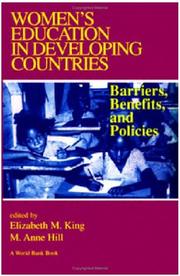| Listing 1 - 10 of 20 | << page >> |
Sort by
|

ISBN: 0803983247 Year: 1990 Publisher: London : Sage,
Abstract | Keywords | Export | Availability | Bookmark
 Loading...
Loading...Choose an application
- Reference Manager
- EndNote
- RefWorks (Direct export to RefWorks)
International economic relations --- Sociological theories --- 316 --- 316.7 --- 316.42 --- #SBIB:316.22H10 --- Sociologie --(algemeen) --- Cultuursociologie --(algemeen) --- Social change. Sociale ontwikkeling. Sociale veranderingen. Modernisering. Evolutie .Sociale revolutie. Modernisme --- Sociologie als product van de samenleving: structureel culturele benadering van de sociologische strekkingen --- Knowledge, Sociology of. --- Social change. --- Social movements. --- Sociology --- Methodology. --- 316.42 Social change. Sociale ontwikkeling. Sociale veranderingen. Modernisering. Evolutie .Sociale revolutie. Modernisme --- 316.7 Cultuursociologie --(algemeen) --- 316 Sociologie --(algemeen) --- Knowledge, Sociology of --- Social change --- Social movements --- Movements, Social --- Social history --- Social psychology --- Change, Social --- Cultural change --- Cultural transformation --- Societal change --- Socio-cultural change --- Social evolution --- Knowledge, Theory of (Sociology) --- Sociology of knowledge --- Communication --- Knowledge, Theory of --- Public opinion --- Social epistemology --- Methodology
Book
ISBN: 1003171656 1003171656 1000641031 1000641082 0367774925 036777495X Year: 2023 Publisher: Abingdon, Oxon ; New York, New York : Routledge,
Abstract | Keywords | Export | Availability | Bookmark
 Loading...
Loading...Choose an application
- Reference Manager
- EndNote
- RefWorks (Direct export to RefWorks)
"The role of cognitive and socioemotional skills alongside education in determining people's success in the labour market has been the topic of a growing body of research-but previous studies have mostly missed middle-income countries and the developing world because measures of those skills and data on employment and earnings on large enough samples of adults have typically not been available. Using comparable survey data on these schooling, skills, and labour market outcomes from 13 developing and emerging economies worldwide, this book revisits human capital and gender inequality models. It presents new estimates of the returns to different levels of schooling as well as the cognitive and socioemotional skills for women and men. It examines whether those returns are due to levels of human capital or to structural bias in labour markets, and how these two factors work across the earnings spectrum. The book examines the existence of "glass ceilings" and "sticky floors" for women using this expanded measure of human capital. Further, by analyzing a group of countries of wide-ranging levels of economic development and sociopolitical contexts, the book reveals patterns and insights into how context mediates the relationship between skills and gender gaps in labour market outcomes. This book will be of interest to scholars of human capital, gender inequality in the labour market and development economics, as well as, gender and development policy makers"--
Women --- Employment
Book
ISBN: 9780367774929 9780367774950 9781003171652 Year: 2023 Publisher: London Routledge, Taylor & Francis Group
Abstract | Keywords | Export | Availability | Bookmark
 Loading...
Loading...Choose an application
- Reference Manager
- EndNote
- RefWorks (Direct export to RefWorks)

ISBN: 0801845343 Year: 1991 Publisher: Washington : World bank. Education and employment division,
Abstract | Keywords | Export | Availability | Bookmark
 Loading...
Loading...Choose an application
- Reference Manager
- EndNote
- RefWorks (Direct export to RefWorks)
Sociology of the family. Sociology of sexuality --- Sociology of education --- Developing countries --- Educational equalization --- Women --- 800 Collectie Vlaams Vredesinstituut --- 810 Theorie en Methode --- 813 Methodologie --- 825 Ontwikkelingssamenwerking --- 834 Arbeid --- 844 Sociale Structuur --- 846 Identiteit --- 847 Onderwijs --- 848 Demografie --- 849 Gender --- 860 (Vredes)cultuur --- Human females --- Wimmin --- Woman --- Womon --- Womyn --- Females --- Human beings --- Femininity --- Education --- Economic aspects --- Historische en vergelijkende pedagogiek.
Book
Year: 1998 Publisher: Washington, D.C.
Abstract | Keywords | Export | Availability | Bookmark
 Loading...
Loading...Choose an application
- Reference Manager
- EndNote
- RefWorks (Direct export to RefWorks)
Digital
Year: 2018 Publisher: Washington, D.C. World Bank Group
Abstract | Keywords | Export | Availability | Bookmark
 Loading...
Loading...Choose an application
- Reference Manager
- EndNote
- RefWorks (Direct export to RefWorks)
Book
Year: 1986 Publisher: Santa Monica, CA : RAND Corporation,
Abstract | Keywords | Export | Availability | Bookmark
 Loading...
Loading...Choose an application
- Reference Manager
- EndNote
- RefWorks (Direct export to RefWorks)
This report addresses several questions about changes in the activities and status of women in Pakistan, Indonesia, and the Philippines. It discusses differences in patterns and trends in these changes across the three countries, and the ways the status of women has improved across generations of families. It examines the factors that explain the patterns in education levels, age at marriage, and the distribution of occupations in these countries. The analysis is based on family and individual data from the Asian Marriage Surveys, which were fielded in 1979-1980.
Women --- Intergenerational relations --- Women's rights --- Social conditions --- Cross-cultural studies. --- Economic conditions
Book
Year: 1993 Publisher: Baltimore : Published for the World Bank [by] the Johns Hopkins University Press,
Abstract | Keywords | Export | Availability | Bookmark
 Loading...
Loading...Choose an application
- Reference Manager
- EndNote
- RefWorks (Direct export to RefWorks)
Women --- Educational equalization --- Education --- Economic aspects
Book
Year: 2018 Publisher: Washington, D.C. : The World Bank,
Abstract | Keywords | Export | Availability | Bookmark
 Loading...
Loading...Choose an application
- Reference Manager
- EndNote
- RefWorks (Direct export to RefWorks)
This paper uses measures of cognitive and noncognitive skills in an expanded definition of human capital to examine how schooling and skills differ between men and women and how those differences relate to gender gaps in earnings across nine middle-income countries. The analysis finds that post-secondary schooling and cognitive skills are more important for women's earnings at the lower end and middle of the earnings distribution, and that men and women have positive returns to openness to new experiences and risk-taking behavior and negative returns to hostile attribution bias. Especially at the lower end of the earnings distribution, women are disadvantaged not so much by having lower human capital than men, but by institutional factors such as wage structures that reward women's human capital systematically less than men's.
Economics Of Gender --- Educational Sciences --- Gender --- Gender & Development --- Human Capital --- Labor Markets --- Returns To Education --- Rural Development --- Rural Labor Markets --- Social Protections and Labor --- Wage Differentials
Book
Year: 2013 Publisher: Washington, D.C., The World Bank,
Abstract | Keywords | Export | Availability | Bookmark
 Loading...
Loading...Choose an application
- Reference Manager
- EndNote
- RefWorks (Direct export to RefWorks)
Few would contest that teachers are a very important determinant of whether students learn in school. Yet, in the face of compelling evidence that many students are not learning what they are expected to learn, how to improve teacher performance has been the focus of much policy debate in rich and poor countries. This paper examines how incentives, both pecuniary and non-pecuniary, influence teacher effort. Using school survey data from Lao PDR, it estimates new measures of teacher effort, including the number of hours that teachers spend preparing for classes and teacher provision of private tutoring classes outside class hours. The estimation results indicate that teachers increase effort in response to non-pecuniary incentives, such as greater teacher autonomy over teaching materials, and monitoring mechanism, such as the existence of an active parent-teacher association and the ability of school principals to dismiss teachers. Methodologically, the paper provides a detailed derivation of a simultaneous ordinary least squares-probit model with school random effects that can jointly estimate teacher work hours and tutoring provision.
Education --- Education For All --- Joint Probit-Ols --- Poverty Reduction --- Primary Education --- Private Tutoring --- Random Effects --- Secondary Education --- Teacher Effort --- Teacher Incentives --- Teaching and Learning --- Tertiary Education
| Listing 1 - 10 of 20 | << page >> |
Sort by
|

 Search
Search Feedback
Feedback About UniCat
About UniCat  Help
Help News
News